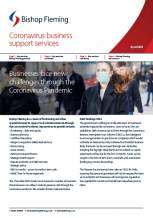Coronavirus Job Retention Scheme: can directors furlough themselves?
UPDATED FOR HMRC GUIDANCE ON 12 JUNE 2020
NOTE: It is now too late to put somebody on furlough for the first time, as 10 June was the last day. But if someone is or has previously been on furlough, or is returning after a period of paternity or maternity leave, they can still be furloughed.
A frequent question we are asked is: can directors of their own companies furlough themselves in order to qualify for the Coronavirus Job Retention Scheme (CJRS)? By being furloughed, the government means being on a leave of absence.
There are currently two schemes in operation:
Whilst the first is aimed at the unincorporated self-employed and members of partnerships, the second is aimed at employees. The government has said that directors are eligible for CJRS,
What is CJRS?
With CJRS, employers can claim for 80% of furloughed employees’ usual monthly wage costs, up to £2,500 a month, plus the associated Employer National Insurance contributions and minimum automatic enrolment employer pension contributions on that wage.
From 1 July, employers currently using the scheme will have more flexibility to bring furloughed employees back to work part time, whilst still receiving support from the scheme. See our article - Flexible Furlough Scheme from 1 July 2020.
With flexible furloughing, from August through to October employers are asked to pay a gradually increasing percentage towards the salaries of their furloughed staff.
Questions for directors and their companies
This raises fundamental questions for furloughed directors - can their companies afford to part fund their furloughed salaries, and what work can directors actually undertake from 1 July?
Employees that can be claimed for
Employees are eligible for the scheme who were on the PAYE payroll on or before 19 March 2020 and which were notified to HMRC on an RTI submission on or before 19 March 2020.
To be eligible for the grant, when on furlough, an employee cannot undertake work for, or on behalf, of the organisation or any linked or associated organisation. This includes providing services or generating revenue. This changes from 1 July under flexible furloughing
Why directors might qualify for the CJRS
HMRC has said that directors can qualify.
However, where a director/shareholder takes a low salary which is topped up by dividends, only the PAYE salary element is covered by CJRS. Dividends do not qualify and thus the grant may be correspondingly low.
The scheme calculations prohibit any change in salary in order to try and boost the CJRS grant.
With the prospect of a part contribution from employers from August, not only does the scheme exclude dividends, it will require companies to part fund their furloughed salaries.
The Chancellor has been lobbied many times about the apparent unfairness of the CJRS for directors, but so far has chosen to leave the scheme as it stands.
During a Treasury Committee hearing on 29 April 2020, Mel Stride MP, Chair of the Committee, urged the government to consider extending CJRS to dividends received by company directors, but to no avail.
Annual salary
In addition, there is a practice among some small owner-managed companies for the directors to pay themselves an annual salary at the end of month 12. But this creates a problem as there have been an RTI submission to HMRC on or before 19 March 2020, which relates to a payment of earnings in the 19/20 tax year.
So the CJRS cannot be used for those on an annual pay period if the last payment notified to HMRC via RTI was before 5 April 2019 and no further payments were notified until after 19 March 2020.
One or more directors
Where a company has a number of directors, it may be more straightforward to see how some could be furloughed and receive the grant, as there would be a continuing director.
A husband and wife run company, for example, could see a situation where one spouse is furloughed and the other carries on running the business. But if they both need the money, as their salaries were below, say, the NIC limit, then they may both consider being furloughed.
It is much less clear and easy where a company only has one director/shareholder, from a practical point of view.
Official guidance for company directors
HMRC has issued the following guidance for company directors:
"As office holders, salaried company directors are eligible to be furloughed and receive support through this scheme. Company directors owe duties to their company which are set out in the Companies Act 2006. Where a company (acting through its board of directors) considers that it is in compliance with the statutory duties of one or more of its individual salaried directors, the board can decide that such directors should be furloughed.
Where one or more individual directors’ furlough is so decided by the board, this should be formally adopted as a decision of the company, noted in the company records and communicated in writing to the director(s) concerned.
Where furloughed directors need to carry out particular duties to fulfil the statutory obligations they owe to their company during hours which they are recorded as being on furlough, they may do so provided they do no more than would reasonably be judged necessary for that purpose, i.e. they should not do work of a kind they would carry out in normal circumstances to generate commercial revenue or provides services to or on behalf of their company.
This also applies to salaried individuals who are directors of their own personal service company (PSC)."
The guidance is welcome, but it would be helpful to have a clearer view of what HMRC regards as "statutory duties", so that there are no misunderstandings later.
The regulations say:
"Work undertaken by a director of a company to fulfil a duty or other obligation arising by or under an Act of Parliament relating to the filing of company accounts or provision of other information relating to the administration of the director’s company must be disregarded..." (Para 6.6)
So the rules appear to narrowly define statutory obligations as meaning complying with an Act of Parliament (e.g. Companies Act 2006) in relation to filing the company's accounts or provision of other information relating to the administration of the director's company.
Presumably such statutory duties would include being able to comply with all regulatory requirements such as filing returns, submitting forms P11D, making the claim for the CJRS, health & safety duties, environmental legislation, employment law, etc.
What is less clear are activities such as:
- Chasing debtors / credit control
- Maintaining security of any closed premises / unused vehicles
- Ensuring delivery of any essential supplies
- Keeping an eye on the company's financial position
- Maintaining relationships with contacts
HMRC's guidance remains unclear on these, and so directors should be wary that the more activities they undertake whilst on furlough, the greater the chance of HMRC refusing to pay the grant under the scheme.
However, from 1 July this becomes less of an issue, as a furloughed director could be brought back into the company on a part time basis.
Companies House has published an article: 7 duties of a company director.
Unofficial guidance issued prior to HMRC guidance
During a Daily Coronavirus webinar hosted by the CBI on 27 March 2020, Ben Kerry, Head of Labour Markets, HM treasury, stated:
"With respect to Directors and owner managers, that does not disqualify them from being furloughed so long as they are on PAYE payroll. I understand that they will have some statutory duties and obligations such as filling up their accounts and they will still be allowed to undertake those statutory duties whilst they are being furloughed so that would not count as doing work. So one of the key conditions of the furlough scheme is that the employee is not allowed to work for the employer, but if you are the owner-manager and you do have statutory duties then you can continued to undertake those duties while being on furlough."
ICAEW statement
Three days later on 31 March 2020, the Institute of Chartered Accountants in England and Wales (CAEW) issued a statement saying it believes that individuals who are directors of their own family companies and who are themselves paid via PAYE should be eligible for CJRS. It stated:
"We are awaiting full details of how the scheme will operate from HMRC, including for directors paid via PAYE but not receiving a consistent, regular monthly salary. We understand the intention of the scheme is to include those on irregular earnings, but full details on how the amount of the grant will be calculated for these individuals have yet to be released.
"As with other businesses, such directors would need to have been on the payroll on 28 February 2020 [revised to 19 March] and they cannot work while they are on furlough leave. We do not yet know the extent to which minor directorial duties would be disregarded, or whether the requirement that a furloughed employee should do 'no work' would prohibit this.
"It is ICAEW's view that in such times as we find ourselves, a pragmatic view should be taken."
Time will tell if that pragmatic view prevails.
Why directors might not qualify for the CJRS
Whilst the above evidence points to the positive, concerns are still there that directors will lose out.
If someone is furloughed, they cannot then work for their company during the period to 30 June, though it then changes under flexible furloughing.
That makes it difficult for a furloughed director up to 30 June, who is put in a position where they effectively can no longer run their own company. Directors could argue that they need to support their customers and seek prospects for future work.
It is hard for a director to justiify being furloughed, especially if they are the sole director. They would certainly need to notify all the company's suppliers, customers and other business contacts that the business was suspended until the end of the Coronavirus restrictions, or when they chose to unfurlough themselves.
The furloughed director should not be spending their time laid off engaged in, for example, business planning for when conditions improve. That would be contrary to the current rules. So this is an undesirable situation.
From 1 July, this becomes more flexible.
Working as self-employed?
There is nothing to prevent a director from having a completely separate self-employment that has nothing to do with the company. Though there would be risks in a director having their company as a client of their self-employed business, due to rules around receiving money from a limited company if you are a director.
Any money received that relates to directors duties is subject to PAYE, and it would be unusual for their company to hire them in a self-employed capacity, unless perhaps they had some special skill that had no connection to their role in the company..
The issue came up with financial commentator, Martin Lewis, in his video of 8 April 2020, where he suggested there was nothing to stop a director from furloughing themselves and then carrying on working as a self-employed individual. But this is different from what is described in the previous paragraphs, and such an option should be viewed with caution for the following reasons:
- If there is work to do, then a claim for CJRS should not be made and HMRC has the right to retrospectively audit all claims for CJRS. It is safer to do the work in the company.
- The CJRS Direction states at para 6.2 - "An employee has not ceased all work for an employer if the employee works for a person connected with the employer ... or otherwise works indirectly for the employer." Working as self-employed for the same clients would contravene this.
- HMRC has additionally made clear in correspondence with Employment barrister, Daniel Barnett, that "the employer and the employee must reach an agreement and an auditable written record of this agreement must be retained". If the furloughed worker continues to do the same work as before in a self-employed capacity, they will be in breach of this agreement.
- More generally, a director on furlough who continues to do the same work in another capacity is potentially diverting money from the company, and this could be a breach of the Companies Act 2006, or challenged by both HMRC and the Insolvency Service or liquidator.
Letter to the Chancellor
On 30 March 2020, Catherine West MP wrote to the Chancellor, Rishi Sunak, to seek clarification. In her letter she says:
"An alarming number of constituents have contacted me concerned that there has been no suggestion of support for single owner / employees in Limited Companies in the statements made last week. The majority of those who have been in contact have paid themselves either no, or a nominal, salary from their businesses in recent years, and have supplemented that income with dividends. At present, they face no financial support despite falling below the £50,000 threshold."
It is not clear what reply was received by the MP, but there have been no moves to cover dividend payments, so going down the furlough route for directors on low salaries is not very remunerative, and even less so from August when a company has to start part funding furlough payments..
Case law
Case law could create a real problem for directors, and the government.
A published article by employment status lawyer, Rebecca Seeley Harris of Re:Legal Consulting (and ex HM Treasury's Office for Tax Simplification) is quoted in The Telegraph on 28 March. She points out that:
“Unfortunately, it is not an automatic assumption that you are an employee of your own limited company.”
Some court judgments have suggested that a sole shareholder of a company cannot be considered an employee. It depends on whether there is an employment relationship between the company and the individual and whether there is a distinction between the director’s role as an officeholder and that of the employee.
The article states that a director’s role as an officeholder is indeed separate and distinct to the role as an employee, even where one individual performs both roles. So, if a sole director is an employee of their own company, they could be furloughed as an employee, but not as a director.
But it would be wrong to assume that a director is an employee of their own company, as there are a number of cases which defined the subject. Two cases in particular:
- Secretary of State for Trade and Industry v. Bottrill [1999]. It held that Mr Bottrill was an employee of the limited company on the facts. Mr Bottrill was the sole shareholder but, the court held that any control he had over the company was merely theoretical, apart from the main fact being that Mr Bottrill had signed a contract of employment with the company.
- Farleigh v. Secretary of State for Trade and Industry [2000]. It was held by the Employment Appeal Tribunal that a sole shareholder could not be an employee of his own limited company for the purposes of a redundancy payment from the National Insurance Fund.
The article states that the key issue with these cases was that the controlling mind of the company could not also be an employee, if they were one and the same person. If you are the controlling mind in the company, how can you make decisions about yourself?
So, it depends on the facts of the case and whether there is evidence of an employment relationship.
Questions to ask include:
- Is there a genuine contract of employment between the director and the limited company?
- Was a ‘statement of written particulars’ issued?
- What did each party do in pursuance of the contract?
- Does the contract actually give rise to an employment relationship?
- How was remuneration accounted for as fees or wages?
- How and for what reasons did the contract come into existence (for example, was the contract made at a time when insolvency was foreseeable)?
The government appears to have skipped over these issues and made it clear that a sole director/shareholder will qualify for CJRS , but that does not mean that the case law may not present a problem further down the line for directors.
[Gary Mackley-Smith]






